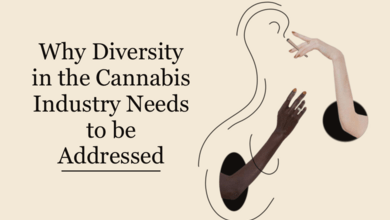
Why Diversity in the Cannabis Industry Needs to Be Addressed
Published on 1/25/21
2020 was an eye-opening year for many. The murder of George Floyd on May 25, 2020, was the catalyst for a nationwide social movement lead by Black Lives Matter. Protests broke out across America, a unified yet organized call for action against police brutality and the systems that have allowed it for so long. For the first time in our history, systemic racism is being addressed publicly on a national scale. Racism has been an issue since before our country's founding; while we have discussed, acted and made progress against the injustices of racism, never before has the country spoken out against racism as a systemic issue.
Our system promotes the oppression of minorities, and now we have the responsibility to confront that fact. Our government, our businesses, our daily perspectives - there is racism built into the foundation of this country and all of our lives. Regardless of what we think our relationship to racism is - no matter your ethnicity, socioeconomic status, political views or age - it is our responsibility to look at each aspect of our lives to identify and change anything that supports systems of oppression. This is true of businesses and industry as much as it is of individuals. The cannabis industry, including the business and people that comprise it, has a responsibility to act upon recent social movements, address issues of racism, inclusion and representation within cannabis, and do everything it can to change for the better of all people.
Racism and Cannabis
 Unsplash
UnsplashCannabis and racism have long been connected. When the War on Drugs began in the early 1970s, it was people of color and poorer, urban communities that paid the heaviest price. Law enforcement unfairly puts underrepresented community members (especially black men) behind bars, simply for possessing marijuana. While we have progressed as a nation, both in terms of racism and cannabis legalization, the numbers still speak to how far we still have to go. As of 2018, black people are still 3.6 times more likely to be arrested for possession than white people, despite the equal reported use of marijuana. Some states, like Montana and Kentucky, have been worse than others, where black people are over 9 times more likely to be arrested for marijuana possession than white people (even though Montana legalized recreational marijuana in the 2020 Election.) Racism and cannabis are still very much connected, and it will remain so until we address all aspects of this large, complicated issue.
The Current State of Diversity and Representation in Cannabis
 Unsplash
UnsplashDiversity and representation are becoming increasingly prevalent points within the cannabis industry, as more and more businesses and organizations realize how little of it there currently is. A recent study found that 81% of marijuana business owners are white, while only 5.7% are Hispanic/Latino, 4.3% are black, and 2.4% are Asian. Even cities that are most commonly associated with cannabis culture and progressive politics are complicit in underrepresentation. The city of Denver conducted a study in June 2020 that found almost 75% of cannabis business owners and 68% of employees are white. The same study noted that Denver residents that are black only make up 5.6% of cannabis ownership and 5.9% of cannabis employees. The cannabis industry is disproportionately run and operated by white people. Hopefully, because of activism both at large and within the industry, we will be seeing this change soon.
Organizations Addressing Diversity Within the Cannabis Industry
 Unsplash
UnsplashThere are quite a few notable organizations within the cannabis industry working to address diversity and bring about real change. The National Diversity & Cannabis Inclusion Alliance (NDICA) is a coalition set on creating equitable employment and ownership opportunities within the cannabis industry for those most adversely affected by the War on Drugs. Sponsored by the state of California, Cannasports, The Hood Incubator and many other organizations set on building representation in cannabis. Think BIG, founded in early 2019 by CJ Wallace, the son of rapper Notorious B.I.G., is a trending social organization focused on fighting cannabis legalization and pursuing police and criminal justice reform. Even though it's a new organization, it is already being featured across news outlets and putting on global webinars about social issues and cannabis. Supernova Women has been on the front of creating awareness and opportunity for women of color in cannabis. They have invaluable online resources, put on annual events and webinars surrounding women, business, and cannabis, and continue to push the boundaries of what diversity in cannabis can look like.
State-Level Equity Licensing and New Representation
Private organizations are not the only forces working toward building representation within cannabis. State and local cannabis equity programs have been created over the last few years to encourage representation within the marijuana industry for those most impacted by prohibition and laws enforced through the War on Drugs. One can typically find social equity programs in legal states, including California, Colorado, Massachusetts, Maryland, Oregon, Washington and Michigan. Governances at both the state and local level provide grants and funding for these equity programs, which then allocate resources to help minority-ran businesses establish and operate. While degrees of success vary within these programs, it remains promising that state and local governments are admitting the wrongs committed to minority populations and are seeking to aid in the future growth of diversity within the industry.
We would love to hear your thoughts on representation and diversity in the cannabis industry. Comment below and tell us your stories, insights and hopes for what we can do to bring equality and inclusion to cannabis across America.








